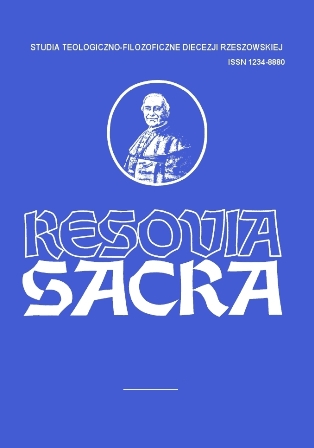ARYSTOTELESOWSKIE „KORZENIE” WSPÓŁCZESNEJ BIOETYKI ISLAMU NA PRZYKŁADZIE KONTROWERSJI WOKÓŁ STATUSU ONTYCZNEGO POCZĘTEGO CZŁOWIEKA
ARISTOTELIAN “ROOTS” OF CONTEMPORARY
ISLAMIC BIOETHICS AS EXEMPLIFIED BY THE CONTROVERSY SURROUNDING THE ONTOLOGICAL STATUS OF THE UNBORN HUMAN BEING
Author(s): Mirosław TwardowskiSubject(s): Philosophy, Metaphysics, Islam studies
Published by: Instytut Teologiczno-Pastoralny im. św. Józefa Sebastiana Pelczara w Rzeszowie
Keywords: Aristotle; Islamic bioethics; human embryo
Summary/Abstract: According to Islamic anthropology, man was created by God and is existentially absolutely dependent on Him. God is the Creator and Lord of every human being. Man as a creature of God is a being composed of a material element and a spiritual element. God is a being composed of the element material and spiritual element. This perspective on man and the soul-body relationship has existed in Islam from its beginnings. Despite this, Muslim thinkers, in order to make the doctrine of Islam more attractive, have tried to combine it with Greek philosophy. The work of Aristotle had a particularly strong influence on Muslim thinkers. For Stagirite, the body-soul relationship is a relationship of unity and complementarity, a psychosomatic whole. Particularly influential, until the end of the Middle Ages, was Aristotle’s view that the fetus becomes a full human being forty days after conception if the fetus is male, and ninety days after conception in the case of the female fetus. In this article, we follow the “footsteps” of Aristotelian decisions still present in contemporary bioethical thinking of Islam, paying particular attention to the debate about the ontological status of the human fetus. There is a difference in opinion of contemporary Muslim thinkers as to the status of the human fetus in the early stages of pregnancy. Some authors believe that regardless of the circumstances the fetus is fully human from 40th day after conception. Others argue that the fetus becomes a human being in the full sense of the word only from 120th day from the moment of conception, from when – as they claim – it has not only the body, but also the soul. Abortion, from the moment at which the fetus becomes fully human, and therefore has a soul, is seen as a form of murder and is one of the worst sins in Islam.
Journal: Resovia Sacra. Studia Teologiczno-Filozoficzne Diecezji Rzeszowskiej
- Issue Year: 2016
- Issue No: 23
- Page Range: 355-370
- Page Count: 16
- Language: Polish

